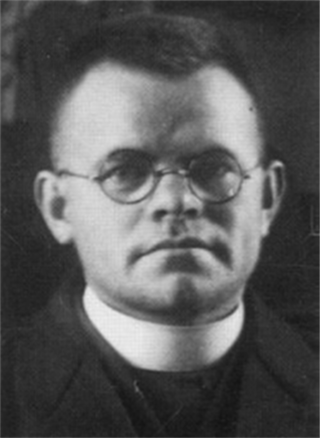Othmar Gächter

Personalia
Born:
Died:
Profession:
Persecution:
Imprisonment 25.02.1939 - 01.06.1939,
Dachau concentration camp 01.06.1939 - 17.07.1940
KZ Number:
Memberships
Curriculum Vitae
Othmar Gächter, who comes from Altach and has been a pastor in Buch near Bregenz since October 1, 1933, is arrested by the Gestapo on February 25, 1939 and taken to the police prison in Bregenz. A request for release by his sister Lina via the lawyer Dr. Jakob Gorbach is rejected by the district leadership of the NSDAP in Bregenz in a letter dated 10.5.1939 as follows: "Pastor Gächter is one of those unteachable people who, wherever they may be deployed, repeatedly demonstrate their hostile attitude towards Nat. Socialism."
The best proof of the correctness of this measure, according to the NSDAP, was that since Othmar Gächter's arrest, "calm, peace and a sense of community have returned to the local group" and that "no one in Buch is waiting for the pastor's return. The party was also of the opinion that Pastor Gächter had to remain in protective custody, as "if the pastor were appointed to another parish, the same thing would happen again that had happened in Buch."
From Bregenz, after failed petitions, he arrived in Innsbruck on 23 May 1939, where, although he was still not convicted of any offense, he had to sign a declaration in which he pledged to be fully loyal to the Nazi regime in future. However, this declaration was subsequently interpreted as a confession that he had not previously acted loyally. He is therefore taken to Dachau concentration camp for re-education on June 1, 1939, where he remains until July 17, 1940.
Pastor Gächter is one of the obdurate ones who, wherever they may be deployed, repeatedly express their hostile attitude towards National Socialism.
[Since Othmar Gächter's arrest,] calm, peace and a sense of community have returned to the local group [and that] no one in Buch is waiting for the pastor's return. The party was also of the opinion that Pastor Gächter should remain in protective custody, as "if the pastor were to be installed in another parish, the same thing that happened in Buch would happen again.
From Bregenz, after failed petitions, he arrived in Innsbruck on May 23, 1939, where he was forced to sign a declaration in which he pledged to be fully loyal to the Nazi regime in the future, even though he was still not convicted of any crime. However, this declaration was subsequently interpreted as a confession that he had not previously acted loyally. He was therefore deported to the Dachau concentration camp for re-education on June 1, 1939. From there, he was transferred to Buchenwald concentration camp on September 26, 1939, where he remained until July 17, 1940.
During this time in prison, three women from his community wanted to support him financially once permission had been granted to give each prisoner in Dachau 15 Reichsmarks per month. For this project, these three women had to spend several weeks in prison in Bregenz.
After his release from prison, he became a pastor in Bürserberg, where he witnessed the liberation of Austria and the re-establishment of the Republic in April and May 1945. In 1952, he finally became a pastor in Mäder.
Places
Persecution:
Place of activity:
Citations
Fritz, Herbert/Krause, Peter (2013): Farbe tragen, Farbe bekennen 1938–45. Katholisch Korporierte in Widerstand und Verfolgung. (ÖVfStg, 2013) S. 294/295.
Vorarlberger Nachrichten vom Donnerstag, den 16.04.1970
